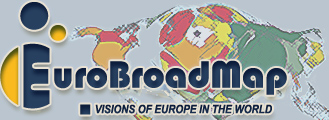Do Europeans really understand how others see them? The European Union represents itself both as a traditional global power (at least in economic terms) and also as a profoundly "transformative" one. The EU’s distinctiveness is derived from its cultural roots, history and institutional framework. The "distinctiveness" thesis however suffers from many shortcomings and it is therefore crucial to examine how the EU as a global actor is perceived by non-European societies (S. Lucarelli, L. Fioramonti, 2008, Have you heard of the EU?).
The conference "Europe seen from here and elsewhere" proposes to critically examine the geographical representations of the world in general and Europe in particular currently promoted within and beyond Europe. The primary aim of the conference is to cross the results obtained by the FP7 EuroBroadMap Project (2009-2011) with research undertaken by other teams from across the globe. The successful dissemination of the project findings to the academic community, political stakeholders, the media and to the wider civil society also represents an additional task . The conference will be structured into three thematic streams exploring different dimensions of the image of Europe in the world. Participants should propose papers or posters focusing on one of these streams.
Stream A: “Europe” of the mind. Unlike the other world powers (the USA, Japan, China, Brazil, India, Russia etc), the EU must seek to combine the often divergent visions produced by its individual Member States, each with a different historical, political or cultural heritage, into a coherent message. Stream 'A' will open two interlinked debates. Firstly, it will examine the different subjective visions of "Europe in the world" that currently exist within Europe/the European Union seeking to determine how these imply different strategies (or the lack of a common strategy), in the external relations and diplomatic strategy of the EU and its Member States. Secondly, it will examine the place allotted to the EU in the visions of the world produced by non-European countries highlighting the implications of these external visions for the future development of EU societies. The objective of this session is to compare the discoveries made by researchers in various disciplinary fields in relation to the existence of various subjective visions of Europe in the world.
Papers should ideally combine theoretical debates, methodological aspects (either quantitative or qualitative) and empirical discoveries.
Stream B: The conflation of “Europe” with the “European Union”. Conflation occurs when the identities of two or more individuals, concepts, or places, sharing similar characteristics become confused to the point where, effectively, a single identity seems to emerge. The EuroBroadMap project began from the assumption that the notion of “Europe” currently used by numerous actors in their mental representations of the world has to be further problematised. Stream ‘B’ will examine – with a historical perspective in mind - how “Europe” could, or should, be distinguished from the European Union in various fields (economics, politics, cultural and symbolic representations). The objective of this session will be to focus on the contradiction between the subjective and blurry object called “Europe” and the political reality called “European Union”. In political terms as in economic terms, the confusion between “Europe” and the “European Union” is a problem that should, however, be amenable to clarification.
Stream C: Borders, networks and fuzzy regionalization of the World: The concept of "border" is not limited to geography and, as such, is widely used in both sociology and political science. How then can it best be applied to the question of problematising the limits of Europe and more generally to discuss and criticise the traditional division of the world into regions or continents? Many divisions of the world can be produced in accordance with various criteria or hypotheses, the delimitation of temporary borders is, however, the result of conflicts between actors who introduce norms into a fuzzy and complex reality. Stream ‘C’ will examine how the classical "mosaic vision of a world" divided into states or continents (P.J. Taylor, 2001, Being Economical with the Geography) can be critiqued on the basis of alternative approaches based on network or fuzzy regionalisation. The objective of this session will be to focus on this conceptual approach to geography in order to identify the “epistemological obstacles” that hamper the development of innovative visions. The session will focus on “European borders” and “continental limits” as a starting point for the exploration of alternative ways of representing the world, based on a non-territorial approach (networks), or a relaxed territorial approach (fuzzy areas, gradients).


